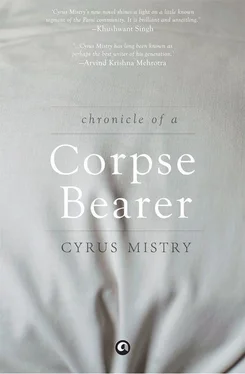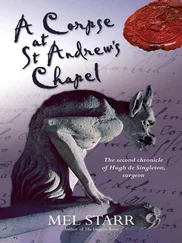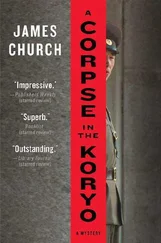The end of World War II saw a spurt in building activity in Bombay. As land prices escalated, the vast wild acres of the Towers of Silence attracted several encroachment attempts.
Almost all of this land had accrued to the Parsi Punchayet over the years, in bits and pieces as well as larger tracts, through the generosity of its wealthy donors. In those early days none of the big builders and land sharks, who would later jointly destroy the charm and beauty of Bombay with their unbridled greed and frantic building, were active yet. Meanwhile, the Punchayet had an encroachment case pending in the High Court against a pair of Muslim brothers called Jameel and Ijaaz Sheikh. These were small fry.
The Sheikhs had owned, since their father’s time, an adjacent plot on the Teen Batti side, on which stood a shop selling brass and copper vessels. Now the father was dead, and the sons had extended its rightful boundaries by about twenty feet into our grounds, setting up there a makeshift hut made of bamboo, planks of wood and thatch. Here they had installed a desk and two chairs, with a painted signboard outside reading — if you please— Real Estate !
On information provided by the Punchayet’s officers, their law firm, Craigie, Lynch and Dubash had served them a notice for trespassing. Eviction proceedings should have started right away, and that’s what the law firm strongly advised, but even in those days, the Punchayet was completely embroiled in a finicky delegation of authority. While they dawdled over procedure, the Sheikh brothers got an ex parte stay order from the court, claiming the disputed land had been paid for by their father, and had been in the family for the past twenty years.
Now it so happened that one morning when Buchia and Edul were measuring the boundaries of the said segment in order to have it fenced, they were rather rudely asked by the elder Sheikh brother to leave, since they were trespassing!
Buchia was furious, and would have assaulted the man there and then, had Edul not intervened and restrained him. That afternoon Buchia organized a posse of about ten young and spirited corpse bearers, asking them to report to him at sundown; he said he had a plan that would show the encroachers their place.
I wasn’t among those picked for this punitive mission. But, after dark, under Buchia’s direction the boys, casually dressed in their sudrahs and shorts, created mayhem at the disputed site, ripping up the wood-thatch-and-bamboo cabin, smashing the table and chairs, pulling down the signboard advertising real estate and breaking it in two. Fali was bent on putting a match to the debris they left behind, but Buchia categorically warned him against indulging his pyromaniacal instincts; at which a disappointed Fali muttered to the other boys under his breath as they walked away, just loudly enough for Buchia to hear:
‘ Saalo bailo!’
When I heard accounts of what fun they had had vandalizing the illegal structure, teasing and roughing up the lackey appointed by the Sheikhs to guard the place at night, I almost wished I had volunteered for the job and shared in their collective discharge of pent-up frustrations. But reprisal was swift, for the brothers made a police complaint. The very next afternoon the Deputy Commissioner of Police, a Mr Ignatius Strickham accompanied by three constables and a police van, entered the secluded premises of the Towers of Silence. Strickham himself rode in on horseback.
(i)
Now this was rather unusual, I should point out. Strickham was obviously new to India, and his job. Perhaps he was trying to impress and intimidate the locals with the added stature the horse gave him. But under the Places of Worship Act first enacted by the East India Company, for more than a hundred years the diverse religious communities of India had been assured the privilege of maintaining the sanctity of their places of worship. Moreover, the small corps of mounted police which had existed in eighteenth century Bombay had been disbanded long ago. I heard later that Strickham was a horse-lover who maintained his own private stable of horses.
As became evident, this arrogant and possibly corrupt officer was entirely out of tune with the times. For the year I speak of was, I think, 1945, or ’46: the War was over, the British were engaged in talks with Indian leaders to find a face-saving and ostensibly fair formula under which to withdraw and return to its own people ‘the jewel of the British empire’, which they had zealously guarded for so long.
‘You there. .! Yes, you, I am speaking to you!’
Concisely insolent in manner, but with an underlying nastiness to his voice the middle-aged Englishman, I’m told, cantered all the way up the hill to where the fire temple broods with its flame kept alive through all hours of day and night.
‘Do you know where I can find the manager. .? Here! I say, do you speak English? I said do you know where I can find the manager?’
Clean-shaven but for a thick moustache that showed flecks of grey, dressed in white flannels and wearing a pith helmet, the deputy commissioner, whom none of us knew to be a high police official, persisted in thus rudely demanding information from two old priests who had emerged from within and stood frozen at the temple’s entrance. Somewhat taken aback to see this ill-tempered, red-faced apparition within a restricted space of the Towers, they pointed mutely in the direction of Buchia’s office, upon which the policeman yanked the horse’s reins fiercely and spurred it on. All who saw this unlikely figure on a brown sorrel, bounding over hedges and galloping down quiet pathways, were stunned; especially to hear him yelling at the top of his voice:
‘Where the hell is that bloody manager?’
When the policeman finally located his office, Buchia happened to have stepped out on his rounds; but it didn’t take Strickham long to find and accost him.
‘Are you Mr Kavarana, the manager of this place?’
‘Who’re you ? Horses are not allowed in here!’
‘You are under arrest, Mr Manager.’
‘And who may you be, sir, if I may ask?’
‘Deputy Commissioner of Police, if that’s any of your business.’
Some of the policeman’s impatience may have communicated itself to the horse, which whinnied and stood on its hind-legs for an instant. Buchia was dumbfounded, and more than a little frightened; he had no idea when he triumphantly and unilaterally undertook to evict the encroachers that he was violating a court’s instructions. He combed his fluffy sideburns nervously with his fingertips before asking:
‘On what charges?’
‘Assault, destruction of property, rioting and disturbing the peace. Come with me, please.’
Meanwhile, the constables in the police van had driven up to the adjoining disputed plot, and escorted back the watchman, who was wearing a white bandage on his crown; as well as Jameel and Ijaaz Sheikh.
Pouting grouchily, and limping every few steps, the watchman — evidently well-tutored by his employers — made a show of identifying members of the previous night’s ‘mob’ for the police; that is, he pointed out almost everyone he came across on the estate (barring the better-dressed mourners at the afternoon’s funeral), including a couple of gardeners who had been busy since early morning planting saplings for a proposed bamboo grove behind Albless cottage, and one seller of sandalwood who normally sat on a chair by the main gate retailing sticks to those attending the day’s funerals but who had left his post propelled by curiosity, alarm and an insidious feeling of excitement when the equestrian Englishman galloped past him.
The burra saheb rounded up men of different ages and professions, and had them bundled into the van — a motley group of corpse bearers in pajamas, sudrahs and prayer-topees, two gardeners in khaki shorts and mud-stained vests, the sandalwood-vendor and Buchia; all twenty-two of them were, moreover, handcuffed, and driven down to the Colaba police station where they spent a rough and sleepless night in the lock-up.
Читать дальше












